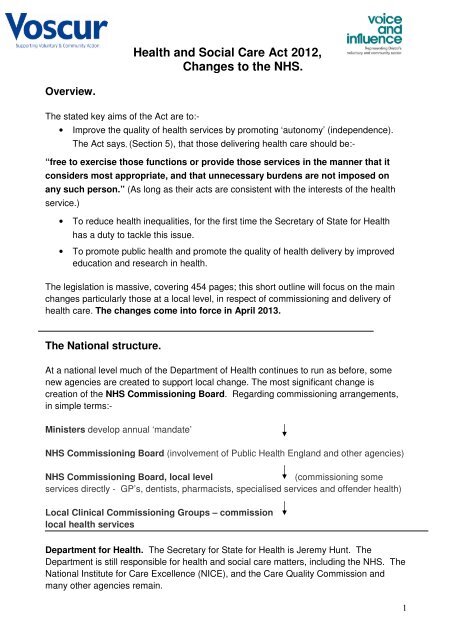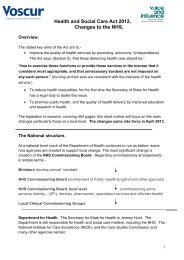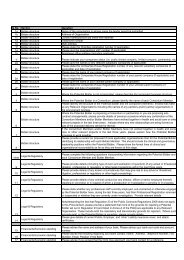Health and Social Care Act 2012, Changes to ... - Voice & Influence
Health and Social Care Act 2012, Changes to ... - Voice & Influence
Health and Social Care Act 2012, Changes to ... - Voice & Influence
You also want an ePaper? Increase the reach of your titles
YUMPU automatically turns print PDFs into web optimized ePapers that Google loves.
<strong>Health</strong> <strong>and</strong> <strong>Social</strong> <strong>Care</strong> <strong>Act</strong> <strong>2012</strong>,<strong>Changes</strong> <strong>to</strong> the NHS.Overview.The stated key aims of the <strong>Act</strong> are <strong>to</strong>:-• Improve the quality of health services by promoting ‘au<strong>to</strong>nomy’ (independence).The <strong>Act</strong> says, (Section 5), that those delivering health care should be:-“free <strong>to</strong> exercise those functions or provide those services in the manner that itconsiders most appropriate, <strong>and</strong> that unnecessary burdens are not imposed onany such person.” (As long as their acts are consistent with the interests of the healthservice.)• To reduce health inequalities, for the first time the Secretary of State for <strong>Health</strong>has a duty <strong>to</strong> tackle this issue.• To promote public health <strong>and</strong> promote the quality of health delivery by improvededucation <strong>and</strong> research in health.The legislation is massive, covering 454 pages; this short outline will focus on the mainchanges particularly those at a local level, in respect of commissioning <strong>and</strong> delivery ofhealth care. The changes come in<strong>to</strong> force in April 2013.The National structure.At a national level much of the Department of <strong>Health</strong> continues <strong>to</strong> run as before, somenew agencies are created <strong>to</strong> support local change. The most significant change iscreation of the NHS Commissioning Board. Regarding commissioning arrangements,in simple terms:-Ministers develop annual ‘m<strong>and</strong>ate’NHS Commissioning Board (involvement of Public <strong>Health</strong> Engl<strong>and</strong> <strong>and</strong> other agencies)NHS Commissioning Board, local level(commissioning someservices directly - GP’s, dentists, pharmacists, specialised services <strong>and</strong> offender health)Local Clinical Commissioning Groups – commissionlocal health servicesDepartment for <strong>Health</strong>. The Secretary for State for <strong>Health</strong> is Jeremy Hunt. TheDepartment is still responsible for health <strong>and</strong> social care matters, including the NHS. TheNational Institute for <strong>Care</strong> Excellence (NICE), <strong>and</strong> the <strong>Care</strong> Quality Commission <strong>and</strong>many other agencies remain.1
GP Practices. They are run as independent organisations, their services are currentlycommissioned by PCTs. The main changes after 2013 are that GP services will becommissioned by the National Commissioning Board, <strong>and</strong> that GP’s though the localClinical Commissioning Groups will be in control of local commissioning of healthservices.What are expected <strong>to</strong> be the benefits of the changes?• To develop local control of health service delivery. The creation of ClinicalCommissioning Groups may achieve this. Local control <strong>and</strong> accountability is seenby the Government as a driver of improved quality <strong>and</strong> innovative service delivery.• Closer links between health <strong>and</strong> social care. <strong>Health</strong> <strong>and</strong> Wellbeing Boards areset up <strong>and</strong> supported by Local Authorities, set a joint health <strong>and</strong> wellbeingstrategy, <strong>and</strong> have power <strong>to</strong> oversee <strong>and</strong> encourage joint working.• More focus on public health. The creation of Public <strong>Health</strong> Engl<strong>and</strong>, <strong>and</strong> aspecific duty on the Secretary of State for <strong>Health</strong> <strong>to</strong> reduce health inequalities.• Hospitals <strong>to</strong> be more responsible for their own financial <strong>and</strong> strategicmanagement. Achieved by the continued development of NHS Foundation Trusts.• More patient <strong>and</strong> public say on health services. Achieved by a legal duty onClinical Commissioners <strong>to</strong> have patient <strong>and</strong> public involvement strategies, <strong>to</strong> drivetheir commissioning activities, so improving services, <strong>and</strong> the introduction of<strong>Health</strong>watch.• Quality NHS services. Local commissioning may lead <strong>to</strong> more creative, morelocalised <strong>and</strong> better quality health delivery, with a strong link between whathappens in GP surgeries <strong>and</strong> the commissioning of health care.What are the criticisms of the changes?• They are <strong>to</strong>o large <strong>and</strong> there is <strong>to</strong>o much uncertainty <strong>to</strong> ensure quality ofservices over the transition period. The argument regarding local au<strong>to</strong>nomy is lostwith the creation of new national overseeing bodies such as NHS TrustDevelopment Authority <strong>and</strong> the role of the NHS Commissioning Board that willhave a regional structure <strong>and</strong> be responsible for some commissioning functions.• There is a lack of guidance about how all the different bodies relate <strong>to</strong> eachother, with a raft of secondary legislation being developed <strong>to</strong> plug the gap, creatinga more bureaucratic system than before.• The changes will be very costly, at a time when the NHS needs <strong>to</strong> find savings<strong>to</strong> cover inflation costs <strong>and</strong> increased dem<strong>and</strong> for services.• That Clinical Commissioners, elected GP’s, <strong>and</strong> other health professionals willlack commissioning expertise at the required level, so will simply take on existingstaff of PCTs <strong>to</strong> do the work, <strong>and</strong> not exercise their control <strong>and</strong> local influences.This paper is an overview of the main structural changes, <strong>and</strong> must not be taken as a definitiveguide <strong>to</strong> the <strong>Health</strong> & <strong>Social</strong> <strong>Care</strong> <strong>Act</strong> <strong>2012</strong>.A series of factsheets are available from the Department of <strong>Health</strong> on the changes:-http://www.dh.gov.uk/health/<strong>2012</strong>/02/bill-factsheets/. For updates <strong>and</strong> general information:-http://www.nacva.org/uk/hscInformation sources:- Department of <strong>Health</strong>, The Kings Fund, NHS Commissioning Board, NHS Bris<strong>to</strong>l, Moni<strong>to</strong>r,Bris<strong>to</strong>l City Council, The Guardian.Dated September <strong>2012</strong>.4
















